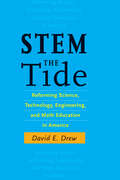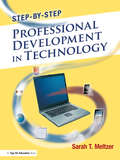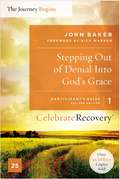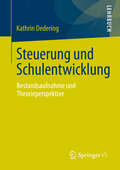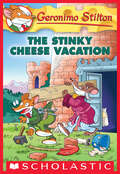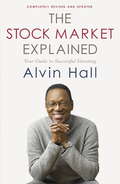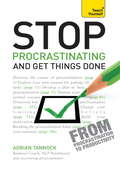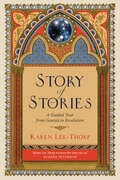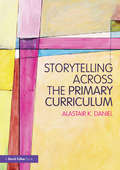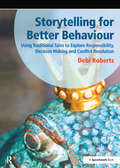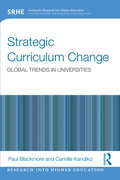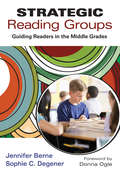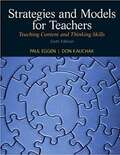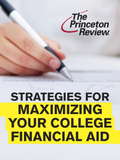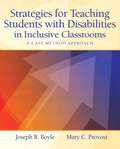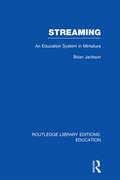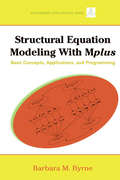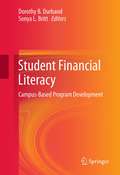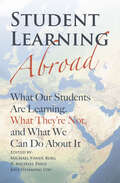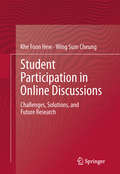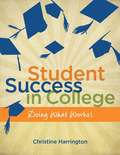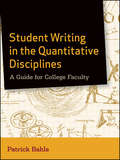- Table View
- List View
STEM the Tide: Reforming Science, Technology, Engineering, and Math Education in America
by David E. DrewProven strategies for reforming STEM education in America’s schools, colleges, and universities.One study after another shows American students ranking behind their international counterparts in the STEM fields—science, technology, engineering, and math. Businesspeople and cultural critics such as Bill Gates warn that this alarming situation puts the United States at a serious disadvantage in the high-tech global marketplace of the twenty-first century, and President Obama places improvement in these areas at the center of his educational reform. What can be done to reverse this poor performance and to unleash America’s wasted talent?David E. Drew has good news—and the tools America needs to keep competitive. Drawing on both academic literature and his own rich experience, Drew identifies proven strategies for reforming America’s schools, colleges, and universities, and his comprehensive review of STEM education in the United States offers a positive blueprint for the future. These research-based strategies include creative and successful methods for building strong programs in science and mathematics education and show how the achievement gap between majority and minority students can be closed. A crucial measure, he argues, is recruiting, educating, supporting, and respecting America’s teachers. Accessible, engaging, and hard hitting, STEM the Tide is a clarion call to policymakers, administrators, educators, and everyone else concerned about students’ participation in the STEM fields and America’s competitive global position.
Step-by-Step Professional Development in Technology
by Sarah MeltzerDon't train your teachers in instructional technology without reading this resource-packed book from Sarah T. Meltzer. Meltzer presents easy-to-follow guidelines for bringing about effective professional development in technology from start to finish. She takes you step-by-step through the process of planning, implementing, and managing professional development opportunities. The book is also filled with handy, practical tools and resources, such as pre-planning worksheets needs assessment surveys long- and short-term technology plans technology inventory forms training schedule templates and more Meltzer provides filled-out examples of those forms, so you can see how to complete them. She also offers blank versions for your own use. In addition, each chapter concludes with a checklist to help you keep track of the steps you take as you make professional development in technology a reality—and a success—in your school or district.
Stepping Out of Denial into God's Grace Participant's Guide 1: A Recovery Program Based on Eight Principles from the Beatitudes
by John BakerThe Celebrate Recovery Participant’s Guides are essential tools for the personal recovery journey. In the six lessons in Guide 1: Stepping Out of Denial Into God's Grace, you will experience the first 3 of the 8 recovery principles: 1 Realize I'm not God. I admit that I am powerless to control my tendency to do the wrong thing and that my life is unmanageable. "Happy are those who know they are spiritually poor" (Matthew 5:3). 2 Earnestly believe that God exists, that I matter to him, and that he has the power to help me recover. "Happy are those who mourn, for they shall be comforted" (Matthew 5:4). 3 Conciously choose to commit all my life and will to Christ's care and control. "Happy are the meek" (Matthew 5:5). By working through the lessons and exercises found in each of the four Participant’s Guides you will begin to experience the true peace and serenity you have been seeking, restore and develop stronger relationships with others and with God, and find freedom from life's hurts, hang-ups, and habits. All the scriptures have been updated to the new NIV 2011 version.
Steuerung und Schulentwicklung
by Kathrin Dedering'Steuerung im Bildungssystem' ist zu einem Schlüsselbegriff geworden, der in dieser Einführung in seiner Relation zur Schulentwicklung dargestellt und erklärt wird. Beide Kategorien 'Steuerung' und 'Schulentwicklung' werden nachvollziehbar konkretisiert und in ihrem Verhältnis zueinander beschrieben. Ausgehend von der Frage, welchen Stellenwert der Aspekt der Steuerung des Bildungssystems bzw. der Einzelschule in einer Theorie der Schulentwicklung einnimmt und welche Relevanz Steuerungsinstrumente für den theoretischen Diskurs besitzen, wird 'Steuerung' als Kategorie verortet. Nach einer theoretischen wie empirischen Analyse ausgewählter Steuerungsinstrumente wird gefragt, welchen Beitrag im diese zu einer Theorie der Schulentwicklung leisten können - mit dem Ergebnis, dass ein eher unzulänglicher Steuerungsbezug in Entwürfen komplexer Schulentwicklungstheorien und ein nur vermittelter schulentwicklungstheoretischer Bezug im Ansatz der Educational Governance zu finden ist.
The Stinky Cheese Vacation (Geronimo Stilton)
by Geronimo StiltonEach Geronimo Stilton book is fast-paced, with lively full-color art and a unique format kids 7-10 will love.I, Geronimo Stilton, was finishing up work one evening when I opened a letter from Uncle Stingysnout. He needed to see me immediately! I headed straight to Penny Pincher Castle for what I thought would be a nice visit . . . but my uncle put me straight to work. Moldy mozzarella, what a terrible vacation!
The Stock Market Explained: Your Guide to Successful Investing
by Alvin HallWhether you are saving for a particular goal, planning towards retirement or simply maximising your capital, financial guru Alvin Hall helps you to:Make more informed choices about your investments.Learn basic analysis techniques to minimize risk and maximize reward.Understand your own risk tolerance and find an investment style that suits your personality and circumstances.Investing in the stock market can be a complex business, but with practical examples and clear definitions, Alvin makes it a highly accessible one, regardless of your investment experience. Fully revised and updated with the latest financial information, The Stock Market Explained provides easy comparisons of the features, benefits, rewards and risks among the different asset classes. This is the ultimate guide to feeling more comfortable (and smarter) about your investment decisions.
The Stock Market Explained: Your Guide to Successful Investing
by Alvin HallWhether you are saving for a particular goal, planning towards retirement or simply maximising your capital, financial guru Alvin Hall helps you to:Make more informed choices about your investments.Learn basic analysis techniques to minimize risk and maximize reward.Understand your own risk tolerance and find an investment style that suits your personality and circumstances.Investing in the stock market can be a complex business, but with practical examples and clear definitions, Alvin makes it a highly accessible one, regardless of your investment experience. Fully revised and updated with the latest financial information, The Stock Market Explained provides easy comparisons of the features, benefits, rewards and risks among the different asset classes. This is the ultimate guide to feeling more comfortable (and smarter) about your investment decisions.
Stop Procrastinating and Get Things Done: Teach Yourself Ebook Epub
by Adrian TannockDo you ever find yourself putting off something that you need to do but you don't want to do? Even though you know you are doing it? And even though it makes you feel guilty? If so, you are one of millions of procrastinators, and this book can help you. Unlike other books on the subject, it starts by explaining the common causes of procrastination, which can range from the psychological (fear of failure, or performance anxiety) to the practical (the task is boring or repulsive). This understanding will form the first step of your journey from procrastination to productivity - a journey in which you will be accompanied all the way by Adrian Tannock, an ex-procrastinator who is now a prolific author and coach, with qualifications in hypnotherapy and NLP.
Stop the Lecturing Start the Conversation: Increasing Your Children's Emotional Intelligence
by Susan SidsworthThis book provides specific strategies for parents, teachers and caregivers who want to enhance the emotional and intellectual intelligence of children. Parents of toddlers often feel frustrated when they cannot communicate with their children in a positive way. Parents of pre-teens and teenagers often feel that their children are "tuning" them out. Many parents resort to lecturing or shouting in order to try and break through these communication barriers. This book aims to provide parents and educators with strategies for establishing a dialogue with children so that they are truly engaged in conversation and the learning process. Establishing a dialogue with children is crucial for our children's emotional, intellectual and social growth. When we establish dialogue or two -way communications with our children we are also part of the learning equation. We have many lessons to teach our children, but our children also have many lessons to teach us. Unfortunately, many of us are trapped in a monologue style of communication. We are telling our children what they can and can not do, we are explaining the rules, we are setting boundaries and we are often not listening to our children. Perhaps you want to protest at this point and say that you do listen to your children and that you try to patiently answer all of their questions. And children are generally asking many questions of the journalistic interrogation kind - Why? Where? When How? What? The fact that children are asking these questions is an indication of their quest to understand the world and the demands that it is making on them. But simply answering a child's questions - patiently or impatiently - is not a true dialogue. A dialogue occurs when two or more people engage in conversation about a subject or a decision and takes turns asking questions and listening to responses. The ideal Socratic Method involves the asking and answering of questions in order to stimulate critical thinking. The opposite of dialogue is a monologue. One person is speaking and others are supposed to be listening. Since monologues eventually become boring and non-engaging children eventually tune out their parents monologues. Many parents will finally exclaim in frustration "Am I talking to myself?" and resort to shouting or talking in an angry tone of voice to get their children's attention. Dialogue, on the other hand, is an engagement and an exchange between two people. This book will provide specific strategies to parents, teachers and caregivers that are designed to enhance the social, emotional and spiritual growth of children and young people.
Storytelling across the Primary Curriculum
by Alastair K DanielStarting from the question ‘what is a story?’ Storytelling Across the Primary Curriculum leads the reader through the theory and practise of storytelling as an educational method – a method taught by the author over the last ten years through Primary English teaching programmes. This practical book gives teachers the skills and confidence to use storytelling and the spoken word in new and exciting ways in the classroom. It will also give teachers the confidence to ‘put down the book’ and trust themselves to tell, rather than read, a story. It provides a wealth of examples of cross-curricular teaching opportunities, including a section on the ways in which the teaching of phonics can be embedded in the 'real' language of story. Storytelling Across the Primary Curriculum is ideal for trainee and practicing primary school teachers who want to develop their classroom practice within the field of storytelling. Students on BA Primary, BEd, and PGCE courses, particularly those specialising in English, will also benefit from this book’s stimulating and intuitive approach to teaching English language and literacy.
Storytelling for Better Behaviour: Using Traditional Tales to Explore Responsibility, Decision Making and Conflict Resolution
by Debi RobertsUsing Traditional Tales to Explore Responsibility, Decision Making and Conflict Resolution provides a method to teach students to reflect, consider and think in ways that can enhance the potential they have for making good decisions and resolving conflicts peacefully. The book provides a series of thinking tools, incorporating both graphic organisers and concept maps and are part of a thinking process known as Theory of Constraint. As well as an approach to conflict resolution, the student programme incorporating over 35 sessions, helps develop emotional literacy. The programme will help students: increase ability to empathise; improve language and communication skills; develop an understanding of conflict in terms of win-win rather than win-lose; and realise behaviour is a choice and that actions have consequences. There are comprehensive facilitator notes for all of the sessions with student PowerPoint slides to reinforce the teaching points. The CD ROM has all the student activity sheets, student PowerPoint as well as a staff development PowerPoint and a Glossary of Terms. Suitable for ages: 7 - 18.
Strategic Curriculum Change in Universities: Global Trends (Research into Higher Education)
by Paul Blackmore Camille B. KandikoThe curriculum is a live issue in universities across the world. Many stakeholders – governments, employers, professional and disciplinary groups and parents – express strong and often conflicting views about what higher education should achieve for its students. Many universities are reviewing their curricula at an institutional level, aware that they are in a competitive climate in which league tables encourage students to see themselves as consumers and the university as a product, or even a ‘brand’. The move has prompted renewed concern for some central educational questions, about both what is learnt and how. Strategic Curriculum Change explores the ways in which major universities across the world are reviewing their approaches to teaching and learning. It unites institution-level strategy with the underlying educational issues. The book is grounded in a major study of curriculum change in over twenty internationally-focused, research-intensive universities in the UK, US, Australia, The Netherlands, South Africa and Hong Kong. Chapters include: Achieving curriculum coherence: Curriculum design and delivery as social practice Assessment in curriculum change The whole-of-institution curriculum renewal undertaken by the University of Melbourne, 2005-2011 The physical and virtual environment for learning People and change: Academic work and leadership This book presents a theorised and contextualised approach to the study of the curriculum, and carries on much-needed research on the curriculum in higher education. It is an essential for the collection of all academics at university level, and those involved in policy making, quality assurance and enhancement.
Strategic Reading Groups: Guiding Readers in the Middle Grades
by Jennifer I. Berne Sophie C. DegenerDifferentiated reading instruction: An effective model for the middle grades Strategic grouping can transform reading instruction in the middle grades from a hit-or-miss learning experience to a targeted, responsive one. This book features a practical and field-tested model for small-group differentiated reading instruction in Grades 4–8. The authors offer a clear, detailed discussion of how to position this instruction inside middle school language arts or reading classrooms and simple, effective strategies for classroom management, groupings, and assessment. This text explains how to: Balance brief strategic reading lessons with whole-class work Structure and guide reading groups consistently Assess students before and during reading groups Cue students and gauge understanding as they read
Strategies and Models for Teachers: Teaching Content and Thinking Skills
by Paul D. Eggen Don P. KauchakThis K-12 teaching methods text continues to focus on instruction, using a models approach that links prescriptive teaching strategies to specific content and thinking objectives. <p><p> Well known for it's practical case-study approach, the Sixth Edition of Strategies and Models for Teachers opens each chapter with a case study that illustrates an instructional model in practice and translates cognitive principles of learning into teaching strategies. This edition is composed of two main parts. <p><p>In Part I the first three chapters describe principles of cognitive learning and motivation theory, teaching strategies that apply to all grade levels, and the teaching of thinking. In Part II, the remaining chapters offer detailed coverage of the individual models, with each model designed to help learners reach specific cognitive, social, and critical thinking goals. <p><p>With a focus on active learning, utilizing research, cognitive psychology, experience, and emphasizes the teacher's central role in the learning process teachers will find this an invaluable resource throughout their career.
Strategies for Maximizing Your College Financial Aid (College Admissions Guides)
by Princeton Review Kalman ChanyFiguring out how to pay for college can be daunting. Fortunately, Strategies for Maximizing Your College Financial Aid provides much-needed expert advice for understanding the financial aid process, managing student loans, and getting the most money for college. In this succinct guide, financial aid consultant Kal Chany and the experts at the Princeton Review present a concise but comprehensive overview of college financial aid. Inside, you'll find guidance to demystify the aid process, and information that will help you: · debunk financial aid myths · figure out financial aid terminology · evaluate financial aid packages and awards · understand grants, scholarships, student loans, work-study, and other forms of aid · fill out the FAFSA (Free Application for Federal Student Aid), CSS/PROFILE, and other financial aid forms · choose a college with financial aid in mind · get started on saving for school
Strategies for Teaching Students with Disabilities in Inclusive Classrooms: A Case Method Approach
by Joseph R. Boyle Mary C. ProvostCombining the best of concept and application, Strategies for Teaching Students in Inclusive Classrooms: A Case Method Approach covers teaching methods and cases from inclusive education settings. Offering an innovative chapter sequence, it pairs concept chapters with case chapters to ensure readers understand core material and can apply it to real situations. Learn about special education law and inclusion, teaching in the inclusive classroom, effective use of behavior management in inclusive classrooms and effective techniques for teaching basic skills such as reading, writing, and mathematics. See how strategies work in real classrooms through the text's clinical and narrative case studies that illustrate core concepts in action.
Streaming: An Education System in Miniature (Routledge Library Editions: Education)
by Brian JacksonIn this volume a streamed school is studied in detail and parents’ responses are recorded. Eleven plus is (and has been) under criticism, but many children are selected by a ‘seven plus’ because they are streamed into A, B or C classes. Few children escape the label once it is pinned on them – less than six in one hundred change their stream. The study shows that on a national sample the date on which a child is born – irrespective of his ability – affects his or her stream at the age of 7 and his results at eleven plus. Finally ten streamed schools are compared, academically and socially, with ten unstreamed schools. In the final chapters the author makes practical proposals by which primary schools could recognise and increase the flow of gifted children.
Structural Equation Modeling with Mplus: Basic Concepts, Applications, and Programming (Multivariate Applications Series)
by Barbara M. ByrneModeled after Barbara Byrne’s other best-selling structural equation modeling (SEM) books, this practical guide reviews the basic concepts and applications of SEM using Mplus Versions 5 & 6. The author reviews SEM applications based on actual data taken from her own research. Using non-mathematical language, it is written for the novice SEM user. With each application chapter, the author "walks" the reader through all steps involved in testing the SEM model including: an explanation of the issues addressed illustrated and annotated testing of the hypothesized and post hoc models explanation and interpretation of all Mplus input and output files important caveats pertinent to the SEM application under study a description of the data and reference upon which the model was based the corresponding data and syntax files available at http://www.psypress.com/sem-with-mplus/datasets . The first two chapters introduce the fundamental concepts of SEM and important basics of the Mplus program. The remaining chapters focus on SEM applications and include a variety of SEM models presented within the context of three sections: Single-group analyses, Multiple-group analyses, and other important topics, the latter of which includes the multitrait-multimethod, latent growth curve, and multilevel models. Intended for researchers, practitioners, and students who use SEM and Mplus, this book is an ideal resource for graduate level courses on SEM taught in psychology, education, business, and other social and health sciences and/or as a supplement for courses on applied statistics, multivariate statistics, intermediate or advanced statistics, and/or research design. Appropriate for those with limited exposure to SEM or Mplus, a prerequisite of basic statistics through regression analysis is recommended.
Student Financial Literacy
by Sonya L. Britt Dorothy B. DurbandCollege students are particularly vulnerable to making poor financial decisions. One method of addressing personal finances and financial stress among students of higher education is through university based financial education programs. Student Financial Literacy: Program Development presents effective strategies to assist in the implementation or the enhancement of a program as a tool to improve students' educational experience and financial well-being. It presents the key components of financial education programs designed to address the growing concerns associated with high levels of debt and low levels of financial literacy among college students.
Student Learning Abroad: What Our Students Are Learning, What They’re Not, and What We Can Do About It
by Michael Vande Berg R. Michael Paige Kris Hemming LouA central purpose of this book is to question the claims commonly made about the educational benefits of study abroad. Traditional metrics of enrollment increases and student self-report, and practices of structural immersion, are being questioned as educators voice growing uncertainty about what students are or are not in fact learning abroad. This book looks into whether these criticisms are justified—and what can be done if they are.The contributors to this book offer a counter-narrative to common views that learning takes place simply through students studying elsewhere, or through their enrolling in programs that take steps structurally to “immerse” them in the experience abroad.Student Learning Abroad reviews the dominant paradigms of study abroad; marshals rigorous research findings, with emphasis on recent studies that offer convincing evidence about what undergraduates are or are not learning; brings to bear the latest knowledge about human learning and development that raises questions about the very foundations of current theory and practice; and presents six examples of study abroad courses or programs whose interventions apply this knowledge. This book provokes readers to reconsider long-held assumptions, beliefs and practices about teaching and learning in study abroad and to reexamine the design and delivery of their programs. In doing so, it provides a new foundation for responding to the question that may faculty and staff are now asking: What do I need to know, and what do I need to be able to do, to help my students learn and develop more effectively abroad? Contributors:Laura BathurstMilton BennettGabriele Weber BosleyJohn EngleLilli Engle Tara HarveyMitchell HammerDavid KolbBruce La Brack Kris Hemming LouKate McClearyCatherine MenyhartR. Michael PaigeAngela PassarelliAdriana Medina-López PortilloMeghan QuinnJennifer Meta RobinsonRiikka SalonenVictor SavickiDouglas StuartMichael Vande BergJames ZullWhile the authors who have contributed to Student Learning Abroad are all known for their work in advancing the field of education abroad, a number have recently been honored by leading international education associations. Bruce La Brack received NAFSA’s 2012 Teaching, Learning and Scholarship Award for Innovative Research and Scholarship. Michael Paige (2007) and Michael Vande Berg (2012) are recipients of the Forum on Education Abroad’s Peter A. Wollitzer Award.
Student Participation in Online Discussions
by Khe Foon Hew Wing Sum CheungThe increasingly prevalent use of online- or blended-learning in schools universities has resulted in asynchronous online discussion forum becoming an increasingly common means to facilitate dialogue between instructors and students, as well as students and students beyond the boundaries of their physical classrooms. This proposed academic book contributes to the literature on asynchronous online discussions in the following three main ways: First, it reviews previous research studies in order to identify the factors leading to limited student contribution. Limited student contribution is defined as students making few or no postings, students exhibiting surface-level thinking or students demonstrating low-level knowledge construction in online discussions. It then identifies the various empirically-based guidelines to address the factors. Second, three potential guideline dilemmas that educators may encounter: (a) use of grades, (b) use of number of posting guideline, and (c) instructor-facilitation are introduced. These are guidelines where previous empirical research shows mixed results when they are implemented. Acknowledging the dilemmas is essential for educators and researchers to make informed decisions about the discussion guidelines they are considering implementing. Third, nine exploratory case studies related to student-facilitation and audio-based discussion are reported on and examined. Using students as facilitators may be an alternative solution to educators who wish to avoid the instructor-facilitation guideline dilemma. Using audio discussion would be useful for participants with poor typing skills or those who prefer talking to typing. The proposed book is distinctive in comparison to current competitor titles because all the findings and guidelines are empirically-based. Furthermore, the nine expanded case studies provided specifically address the issue of student/peer facilitation and audio-based discussion. Student/peer facilitation and audio discussion are two areas that hitherto received comparatively lesser attention compared to instructor facilitation and text-based discussion.
Student Success in College: Doing What Works!
by Christine HarringtonThis book offers an accessible and relevant way for students to move beyond opinions and advice about how to succeed in college by offering an integrated approach of researched back student success practices paired with student success research studies.
Student Writing in the Quantitative Disciplines
by Patrick BahlsThe book introduces readers in the often-overlooked math-related fields and STEM disciplines to the ideas of writing-to-learn (WTL) and writing in the disciplines (WID). It offers a guide to the pedagogy of writing in the mathematical sciences, and gives theoretically grounded means by which writing can be used to help undergraduate students to understand mathematical concepts at all levels of study. The author equips instructors with the practical skills necessary to guide their students in writing well in math-based courses at all levels of the college curriculum, addressing various genres of mathematical writing (research articles, expository articles, abstracts, literature reviews, pedagogical writing), and provides the criteria for assessment.
